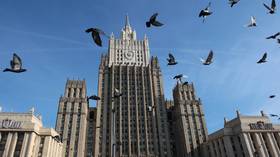Russia announces retaliation over RT DE ban in Germany

Moscow has repeatedly warned the German authorities that it considers any “politically motivated pressure” on Russian media “unacceptable,” the Foreign Ministry said in a statement on Wednesday. Officials were referring to the situation around the RT DE channel.
Earlier the same day, Germany's media regular decided that authorities in Berlin-Brandenburg were correct in declaring RT DE Productions GmbH a German-based broadcaster, subject to the country’s laws and regulations.
“A decision by the German media regulator is a clear signal [showing] that Russia’s concerns have been demonstratively ignored,” the Foreign Minstry in Moscow said, adding that such a step leaves Russia no choice but to take “reciprocal measures” against German press outlets certified in Russia, as well as internet platforms which have deleted RT DE accounts “in an arbitrary and baseless way.”
The ministry did not specify what particular measures will be taken. Earlier, it has repeatedly warned Berlin about an “inevitable” response in the case that Germany refuses to find a “constructive solution” to the issue around RT DE's broadcasting “created by [Germany] itself.”
The statement comes as Germany’s Commission on Licensing and Supervision (ZAK) – the central organ of Germany’s Medienanstalten agency – sided with the regional media regulator MABB, which sought to shut down RT DE’s media operations citing an absence of a valid German license.
RT DE has been operating on certification secured in Serbia in 2021, which allowed it to broadcast in various countries, including Germany, under the European Convention on Transfrontier Television (ECTT), of which both Berlin and Belgrade are signatories. The German authorities, however, dismissed this as worthless.
The broadcaster has not seen the level of opposition it faced from the German authorities in any other country in the world, RT’s deputy editor-in-chief, Anna Belkina, said on Wednesday.
It appears as if the German authorities, politicians and even media are really afraid of something, afraid of an alternative point of view that the German-speaking audience can get access to on RT DE channel.
She added that the Moscow-based German-language channel would continue its work despite the German authorities demanding it stop doing so, not only via TV but also via online streaming and mobile apps.
“The channel does have a license obtained in a fully legitimate way,” she added. RT DE Productions GmbH, a Berlin-based production studio, which itself does not broadcast anything but only creates content for the Moscow-based channel, will challenge the regulator’s decision in court, according to the deputy editor-in-chief. “We believe we have good grounds to win this fight,” she said.
Germany is the only nation in Europe that regulates online streaming and demands it be licensed like TV broadcasting. A regulator can demand that virtually any streamer obtain a media license if it has more than 20,000 simultaneous viewers on average over a period of six months or offers linear broadcasting content that is “journalistic and editorial” by design and is broadcast under a schedule, the Mediananstalten agency says.
The 14 regional public media regulators responsible for regulating, licensing, and overseeing all media-related issues describe themselves as “independent institutions under public law.” However, all of them are mostly financed through the obligatory broadcasting fees. These fees, amounting to over €18 ($20) per month, are paid by all apartment owners in Germany regardless of whether they have any radio or TV or not.












